To Bee Or Not To Bee
Arati Ningombam, Romila Akoijam, Aruna Beemrote, N Ajitkumar Singh, S K Sharma *
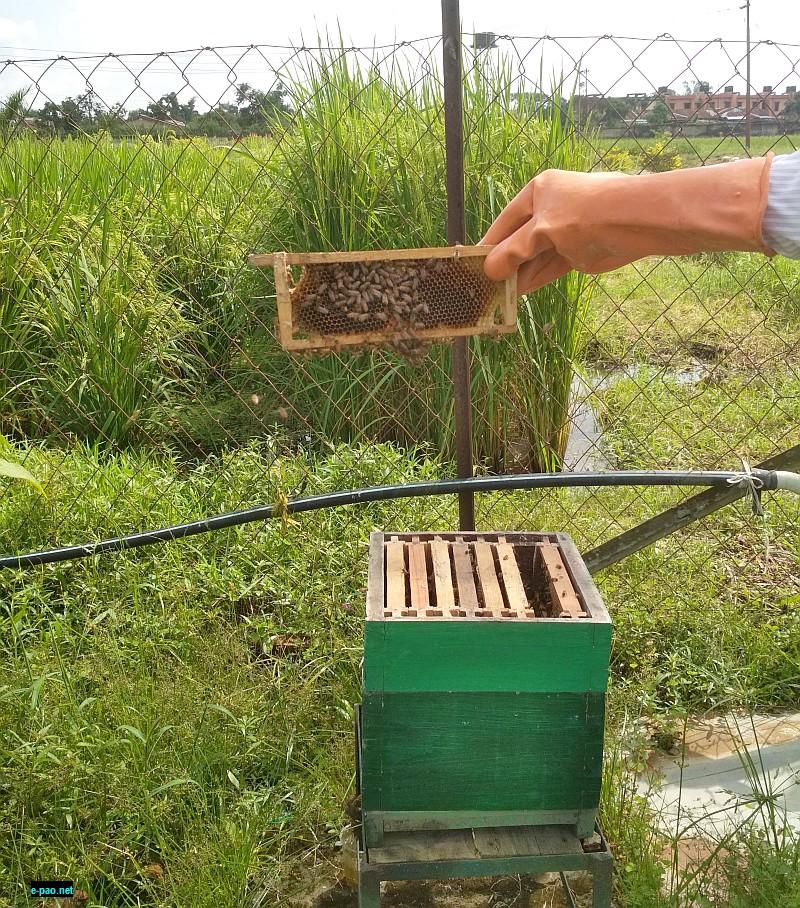
Bee Keeping :: Photo by Arati Ningombam
"If the bee disappears from the surface of the earth, man would have no more than four years to live. No more bees, no more pollination ... no more men!"
-Albert Einstein
Beekeeping for harvesting honey is an age-old practice traditionally done in mountains, foothills, forest, agricultural lands, mangrove forests etc. around the world since time immemorial. Studies and empirical observations have established that beekeeping has great importance in the agriculture-based economy with pollination services, especially in oilseeds and pulses production.
Under the rural development programme in India, beekeeping as a part of secondary agriculture is regarded as an important, sustainable, integral agricultural activity, since it provides nutritional, economic and ecological security and balance.
Honey bees, apart from yielding honey and wax, and acting as pollinators, also yield valuable products like royal jelly, bee pollen, propolis and bee venom having nutritional/medicinal values.
Natural Composition of Honey:
Honey is a natural food that contains about 200 substances, and consists mainly of sugars, water, and other substances such as proteins (enzymes), organic acids, vitamins (especially vitamin B6, thiamine, niacin, riboflavin and pantothenic acid), minerals (including calcium, copper, iron, magnesium, manganese, phosphorus, potassium, sodium and zinc), pigments, phenolic compounds, a large variety of volatile compounds, and solid particles derived from honey harvesting.
The composition, colour, aroma and flavour of honey depend mainly on the flowers, geographical regions, climate and honeybee species involved in its production, and are also affected by weather conditions, processing, manipulation, packaging and storage time. Honey is a food that undergoes many changes in its composition during storage.
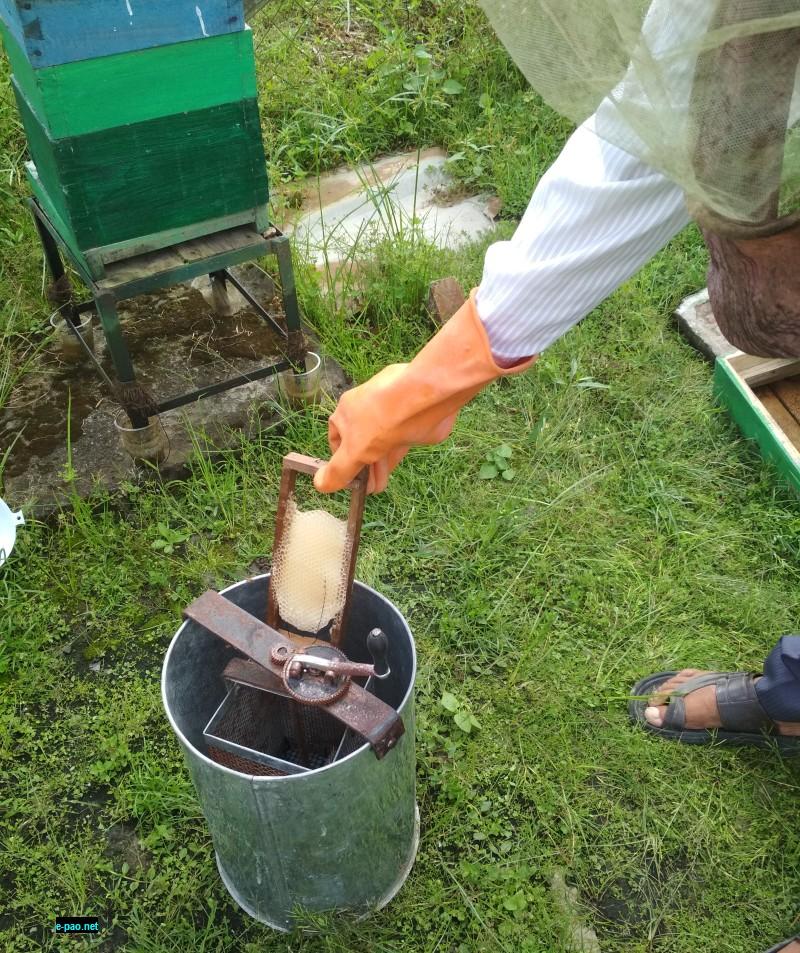
Bee Keeping :: Photo by Arati Ningombam
Ecosystem services by Bees:
Honeybees besides providing honey also perform the additional ecosystem functions and services such as pollination which are invaluable and irreplaceable. These ecosystem services indirectly help the farmer to get more productivity out of his farm by increasing yield of fruits and vegetables through higher pollination especially in often-cross pollinated and cross-pollinated crops (fruits, seeds, vegetables, fibre crops and nuts).
Pollinators also play an often unrecognized role in combating soil degradation by enhancing the replenishment cycle i.e. more pollination, more seed, more plants, returning more biomass to the soil, more food for birds, insects and other animals. Globally the annual contribution of pollinators to the agricultural crops has been estimated at about 153 billion Euros.
According to Dr Swaminathan, Father of the Green Revolution, a Second Green Revolution is possible in India only by increasing the pollinators, such as the honeybee.
Bees in India and Manipur:
The Khadi & Village Industries Commission has identified the North East region including Manipur as one of the potential regions for the development of the beekeeping industry, especially in the production of natural and wild honey. Honeybee keeping is a component of Secondary Agriculture which can be easily taken up by interested farmers no matter the size of his field or crops cultivated.
Bee hunting was a part of traditional culture in Manipuri society and traditional honey is considered a delicacy irrespective of various ethnic tribes in Manipur. It is widely used as a part of ethnomedicine by various traditional healers among different tribes too.
India has four native species of honeybees i.e.
1) Apis dorsata (the rock bee)
2) Apis cerana (the Indian bee)
3) Apis florea (The flower bee or little bee) and
4) Trigona irridipennis (Dammar bee or stingless bee) with proven potentiality in beekeeping.
The exotic species Apis mellifera has been introduced from European countries during the 1960s in foothills of Himachal Pradesh and agricultural plains of Punjab. A. cerana, A. mellifera, Trigona spp. are domesticated, however, A. florea and A. dorsata are undomesticated.
A. dorsata, (khoiren) is found in foothills of the Himalayas and northern regions of the country. Large colonies of these ferocious bees are present in the hills and forests of North East India which is a source of wild/organic honey. The southern part of India is also having a large number of A. dorsata colonies and contribute a large share of total honey production in India. The honey production from rock bees within NE India is undocumented.
Apis cerana (Heiying khoi) is available throughout the country and has two subspecies; A.cerana cerana and A.cerana indica. Another subspecies of A. cerana i.e. A. cerana himalaya is also found in Manipur.
A. cerana beekeeping is practised in India since time immemorial. A. cerana is a good pollinator, and have high survival capacity due to the co-evolution with native floral sources, pests and predators accustomed to the same climatic conditions.
A. florea (Heiying khoi nakupi), is common in the central part of India, occurs in the arid and desert region of extreme climates, and also in plains and forests. They produce very less quantity of honey with a thinner consistency.
Trigona sp. (Khoining khoi) is common in all parts of the country and remains for long periods in the same abode. It is a very small bee and collects nectar from small flowers. Since the quantity of honey produced is small, these bees are not commercially used. It is a very important crop pollinator, and their honey has repute in folk medicine.
In terms of quantity of honey production as well as other products such as propolis, royal jelly, pollen etc., the European bee, A. mellifera is the highest producer and has many good qualities e.g. swarms less, gentle-tempered, good honey-gatherer, prolific queen and guards its nest against enemies except wasps.
However, it has not adapted well to the climate of Manipur being of European origin and its introduction into the state was not quite successful. A. cerana seems to be the better species under Manipur conditions for commercial honey beekeeping.
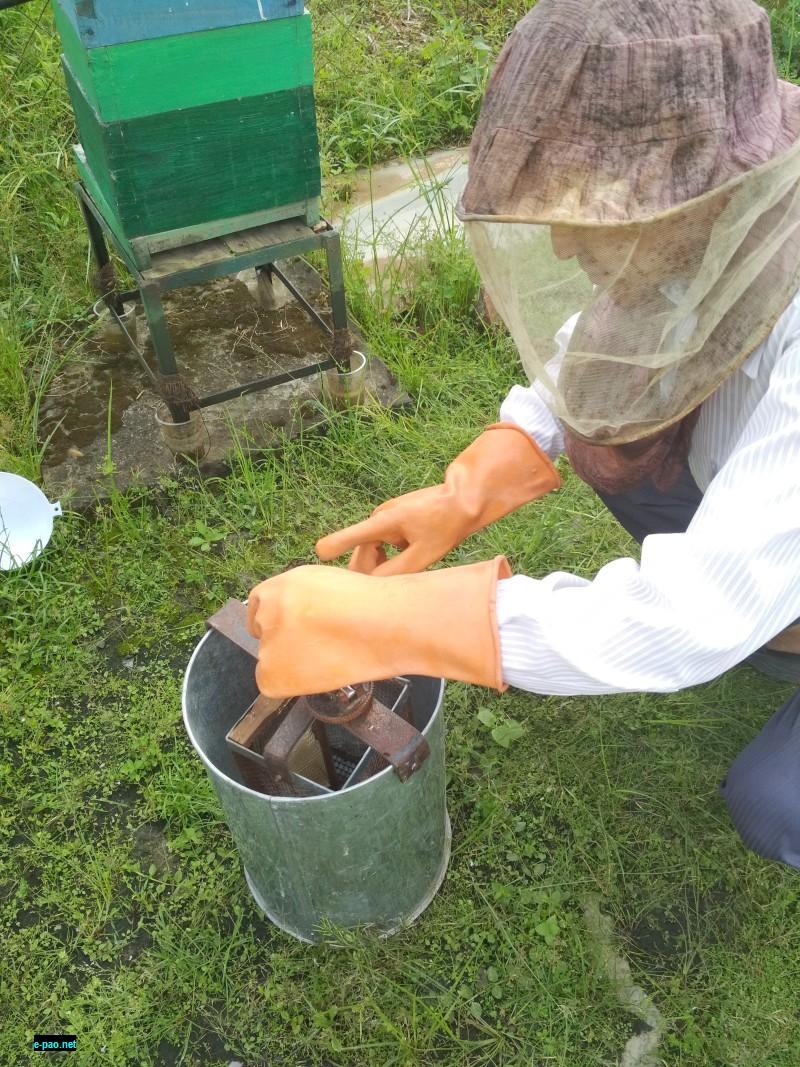
Bee Keeping :: Photo by Arati Ningombam
There is widespread availability of bee flora throughout the state that provides a pollen and nectar source to the foraging bees throughout the year. Different vegetables, fruits and flowers are abundantly grown in the state besides medicinal plants and flowering trees which serve as excellent bee flora.
The taste of the honey differs depending upon the season and the vegetables and flowers are grown in that season. Rabi season is usually considered a lean period but recently, rapeseed mustard and/or pulses such as lentils and pea are cultivated after paddy in large scale, and this also supplements the bee flora available in the season.
The economic aspect of Beekeeping:
Beekeeping has been a thriving business for the last 20-30 years in the state which enables beekeepers to fetch a good income to maintain a comfortable living.
Beekeeping does not demand huge investment, heavy machinery or manpower etc. One can take up bee farming anytime comfortably with some bee boxes and knowledge in the field. Expertise and ease of handling will come with time and practice.
As the demand of the honey is increasing day by day, the market price of honey per bottle (700ml) is ranging from ₹500/- to ₹700/-, if the honey is pure. The national average harvest yield is about 5- 6 kg per year. But in Manipur condition, if the scientific method of beekeeping is followed, then the yield of up to 8-12 kg per year can be assured.
Believe it or not, a landless farmer can earn as much as a rice farmer cultivating one hectare of paddy by starting a bee farm with just fifteen (15) bee boxes.
Bee keeping can be considered as an excellent, profitable agro-based enterprise for landless farmers and entrepreneurs as well as a good source of additional income for farmers practising Integrated Farming System.
The future for bees:
The present trend of injudicious application of chemical pesticides is a huge threat to the ecological diversity and population of bee species around the world including Manipur. Although contact pesticides are worse than systemic ones, even systemic pesticides are not to be considered safe.
Neonicotinoid group of insecticides such as imidacloprid, clothianidin and thiamethoxam (all systemic) which are very popular among the farmers of Manipur are clearly implicated for the decline of bee species in Europe. These pesticides not only reduced a bee's chances of survival but also impair its natural defence systems. Bee poisoning by chemical pesticides takes place in many ways.
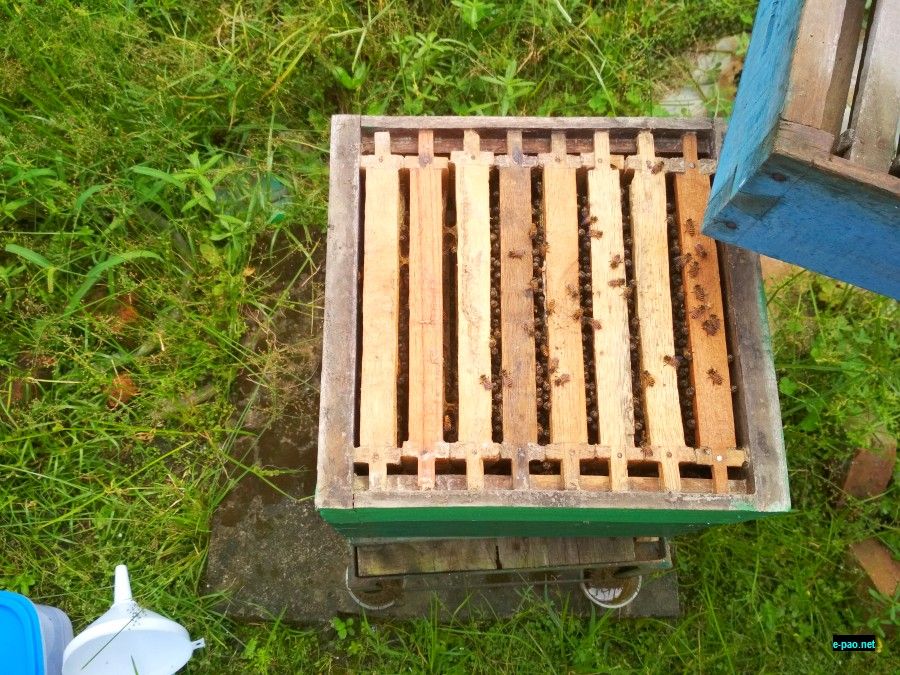
Bee Keeping :: Photo by Arati Ningombam
A toxic cocktail comprising of fungicides, weedicides and insecticides used in the agroecosystem is gradually causing a decline in wild bee's population and diversity around the world. Even if the pesticides are not directly targeting bees, they bear the ultimate consequences along with other beneficial insects such as dragonflies, damselflies, ladybird beetles, spiders and many parasitoids that prey on crop pests.
In Manipur, the trend of using chemical pesticides as the first and only resort to pest management and mostly based on hearsay without expert recommendations is a dangerous one, to begin with. This is further complicated by spraying chemical pesticides in the morning hours when foraging bees come in search of pollen and nectar and when natural enemies are actively searching their prey.
Destructive method of honey hunting should be discouraged as every year, 40 to 50% of the rock bee colonies are lost and fail to complete their respective breeding cycles. Their decline in strength is a threat to the ecosystem. At the same time, scientific beekeeping has to be encouraged for the economic upliftment of the tribal populations in the remote forest and hill areas. It helps in the conservation of the resources, and also improves the health, nutritional and economic status of the people in these areas.
To provide a safer environment and to safeguard our bee population-both wild and in domesticated hives; we can easily adopt certain practices that will go a long way in ensuring a better, sustainable and ecologically balanced world viz. Pesticide application should be a decision that should not be made lightly.
Before using an insecticide, make absolutely sure that chemical control is necessary and that it is the best management alternative. Use the principles of integrated pest management, safer alternatives such as botanicals/biopesticides always and always spray pesticides in the evening hours.
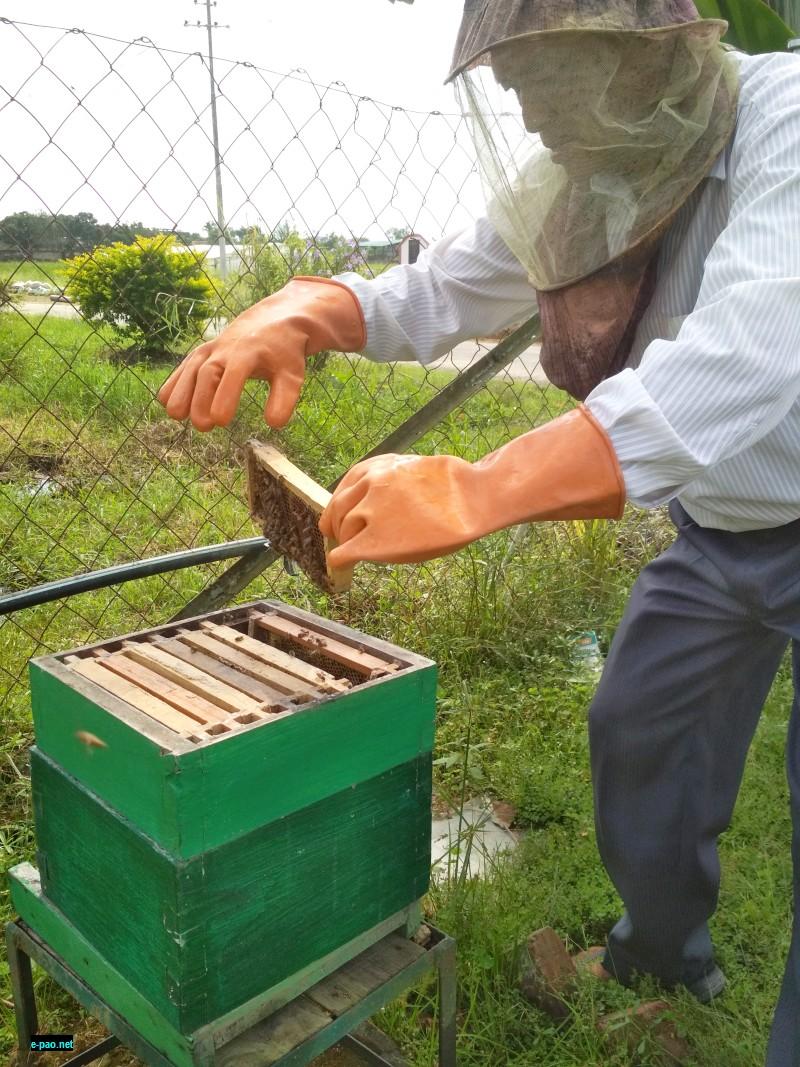
Bee Keeping :: Photo by Arati Ningombam
Contributors:
o Arati Ningombam, Romila Akoijam, Aruna Beemrote, Scientists (Entomology),
o S K Sharma, Scientist (Plant Pathology)
o N Ajitkumar Singh, SMS (Plant Protection), Krishi Vigyan Kendra, Ukhrul
o ICAR Research Complex for NEH Region, Manipur Centre, Imphal - 795 004
Author's Note:
While science and technology are advancing at break-neck speed, we still do not know the changes happening at our back door or kitchen garden. Only knowledge could lead to the correction of our mistakes caused by ignorance and misinformation.
I wish to submit an informative article regarding honeybees - their importance including economic aspects and the threats leading to their gradual disappearance.
I hope that this article will shine some light on a tiny beneficial insect and its role in our environment.
* Arati Ningombam, Romila Akoijam, Aruna Beemrote, N Ajitkumar Singh, S K Sharma wrote this article for e-pao.net
Arati Ningombam can be reached at arati(DOT)ning(AT)gmail(DOT)com
This article was webcasted on June 28 2019.
* Comments posted by users in this discussion thread and other parts of this site are opinions of the individuals posting them (whose user ID is displayed alongside) and not the views of e-pao.net. We strongly recommend that users exercise responsibility, sensitivity and caution over language while writing your opinions which will be seen and read by other users. Please read a complete Guideline on using comments on this website.








